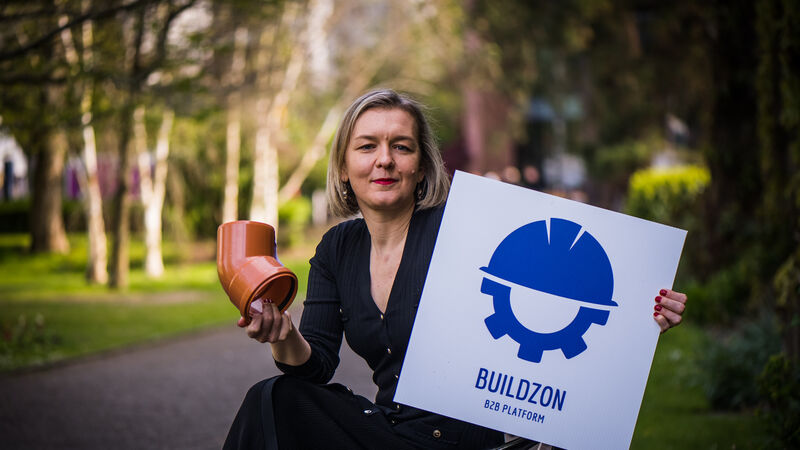Cork-based woman's business is helping the construction industry access and save money on materials

Monika Wojtek of Buildzon. Picture: Joleen Cronin
WHEN engineer Monika Wojtek first moved to Ireland to continue her career as a facilities and project manager, one standout observation was how expensive building materials were.
“I remember looking at pricing and thinking we have identical products in Poland, of the same quality, but at a fraction of the cost,” she said.
An inveterate problem solver, Monika says “solutions is her forte”. And she has developed two parallel businesses that harness this expertise.
The first, Montek, is a project-specific company where Monika is the sourcing agent for building materials and components for construction projects. Using both her knowledge and experience of the construction industry she has been looking at ways in which to allow the industry access to better priced products.
“I’m driven by the desire to create value for money by looking at products either not currently available in the Irish market or that are very expensive by comparison to Eastern Europe and looking to import these.
“I understand both the language and business culture in Eastern Europe as well as having an in-depth knowledge of the construction industry here and its needs.”
Monika is not planning to house an infinite supply of materials in a warehouse-setting in Ireland, but will order in quantities on a project-by-project basis.
The ultimate goal is for builders to scale their requirements and order in advance.
“If they pre-order three to six months before needed on site, the price will obviously be better, and we can guarantee delivery on time.
“It is exactly the same effort on their part, but the cost will be fundamentally lower the earlier they order.”
Her second business is a B2Bonline building materials platform. Styled like an Amazon for the construction industry, its aim is to create a network of strong, reliable and experienced suppliers which can be accessed not only by builders but also trades people, architects, project managers, interior designers, mechanical and electrical contractors among others, who would also benefit from such information.

From her work as a sourcing agent on specific construction projects, Monika realises that at the core of the challenges for buyers is the way in which business in the building industry is conducted in Ireland.
“The discount you get on building materials really depends on who you are, the quantities you purchase, the repeat orders and who you are dealing with.
“There is limited clarity for the purchaser as prices are not readily displayed and effectively all transactions are done on the suppliers’ terms.”
This can be deeply frustrating for buyers as “prices are kept very close to the chest as well as being time-consuming, calling lots of different suppliers and trying to secure the best price”, says Monika.
The BuildZon platform will offer users real-time access to prices from multiple vendors, volume discount transparency, delivery reliability, and a tracking system. It aims to generate time certainty and price savings of up to 25%.
While much of the trade is still focused on in-person transactions, Monika believes that the younger generation will embrace the access to online info on BuildZon.
“If you provide information on demand, people will go for it. The purchasing dynamic is going to change as with many other online shops.
“Younger people are very comfortable with using their phones / online shopping. Many prefer text to talking and sourcing things online comes naturally to them.”
Observing the world post- Covid, Monika’s says the rise in the price of materials is endless, with the need for cost savings more relevant than ever.
Having lived in Ireland for the past 16 years, and Cork since the pandemic, Monika says she found that going to college really helped build her network in Ireland.
“I think if you don’t go to school or college here, it makes it more challenging to get established or connected to a business network.
“I spoke with one kitchen maker from Limerick who felt compelled to change the registration on his van to a Cork registration to appear more local for their customers. I found it hard to believe that business is so local in this industry, yet many don’t know or care where their online clothes and other purchases come from.”

The New Frontiers programme at the Rubicon Centre, in MTU, has been wonderful for Monika.
Having already earned not only an MBA from Trinity College, but also graduated from the IGNITE programme in UCC, she attests that the benefits and network potential of the New Frontiers are “fantastic”.
“On the New Frontiers programme, I am meeting people at every stage of their career. From the younger entrepreneurs to those at the same stage in their lives as me. Talented individuals, some with little experience to others with more than 20 years working in industry with real expectations, who don’t shy away from hard work, and who have an innate determination to succeed.”
The MBA had a lot of different individuals on the course, from lawyers and financiers, to marketing and manufacturing specialists. It delivered a broad-based education about running a business which was invaluable to me.
“I am delighted to be able to apply the general knowledge of the MBA as I progress through the New Frontiers programme.”
In fact, Monika feels grateful to be able to draw from all the skills she has learned and acquired through her education in Ireland.
“Having the association with MTU’s Rubicon centre is such a fabulous starting point in dealing with businesses and a huge advantage. It gives credibility to what I am saying. People listen to me and and there is an instant connection as a result.”
Monika’s long-term plan is to ultimately create a space on the BuildZon platform for products that could be reused and resold. Items that may have been left over from a construction project that would otherwise end up in landfill.
“There is no industry process or agreed approach of how-to re-use materials,” says Monika.
Simple reuse of crushed concrete from demolition or sending metal for recycling is as much as the industry has achieved. The opportunity is to reuse materials that are salvaged or surplus to requirements. Food cloud is a great template where supermarkets donate food that is close to its ‘best before’ or ‘use by’ date to charities. The building industry has a similar opportunity.
Along with fellow New Frontiers’ entrepreneurs BladeBridge’s Angie Nagle and Mary O’Riordan of HaPPE Earth, she is thinking of ways to contribute to the circular economy by introducing a digital space where builders are encouraged to reconsider consigning left-over materials to the dump and instead, achieve SDGs (sustainable development goals) for themselves and the construction industry by reusing rather than recycling.
We will continue our series with women taking part in the New Frontier programme at MTU’s Rubicon Centre next week.







 App?
App?


